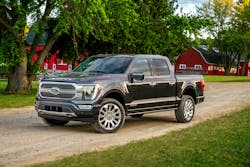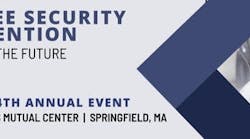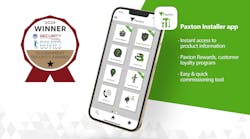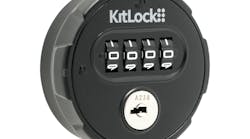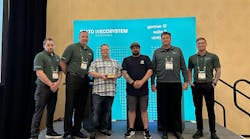The acceleration of the production and distribution of vaccines has provided optimism that the tide finally might be turning against the COVID-19 pandemic and that people soon will be able to resume more-normal activities, such as larger in-person gatherings.
Locksmith Ledger is publishing a series of articles that attempt to assess the 2021 business climate through the eyes of security industry manufacturers. We want to know how the companies are faring during these troubled times, how they assess the security industry at large and what locksmiths and security pros can do to take advantage of the situation.
Our latest interview in the series was conducted with Jeff Baker, distributor sales manager at STRATTEC Security Corp.
What are the prospects for the automotive security industry in 2021? What are the prospects for your company in 2021?
The need for automotive keys and replacement locks and keys is steady, and 2021 shouldn’t be any different. Many times when new-car sales are hindered or slowed by an uncertain economy, consumers choose to repair their vehicles and hold on to them a little longer. This includes adding extra keys they might have lost or replacing that failing door lock or sticky ignition. This keeps our distributors busy and ultimately the automotive locksmith. STRATTEC seems to be positioned well from an OE [original equipment] standpoint with many new programs and vehicles on the horizon. From an aftermarket standpoint, we also are positioned well in our OE offering on keys, remotes and locks as well as our expanded line of aftermarket remotes.
Can you give us a preview of what’s on the way?
We got approval from Ford and GM to add to our licensed product with them. On the Ford side, there were some delays in adding product sold at the dealer level as well as in the aftermarket. We have some work to do in getting inventory built up and getting those remotes released and marketed to the locksmiths, but they’re on their way. On the GM side, there will be some delays there. I’m getting 10 new fobs — they’re approved on licensing, but the supply chain has slowed down some, so that might hold the market up a little bit. Once we can get stock, we’ll be able to sell them. Will they be out there by the time this article comes out? Not exactly. We can start talking about it though.
COVID is changing how people’s notions of security as far as interacting with buildings. What effect has it had on the automotive industry?
No real effect. Automotive production and related industries were deemed essential both in our state as well as in Mexico. We had to be more responsive than ever to our OE customer base including GM, Ford and Fiat to keep programs and assembly plants running. Our production facilities in the United States remained open to produce core products for our assembly facilities in Mexico. The limitations came when we had to limit personnel in those Mexican facilities because of COVID. Sometimes less than 60% of personnel were permitted onsite. We had to open up more shifts and run around the clock to keep the assembly plants we supply in parts.
Were there any additional specific challenges of coordinating work between locations in two separate nations during a pandemic?
Not really. The situation there had similarities to what we were dealing with here. We just had to plan ahead more. Last year, let’s say February, March, one of the things that we did early on was keep our inventories up so we were prepared to support assembly plants if we were shut down in Mexico. There might be X number of weeks available on the shelf, and we tried to extend that as much as we could. That goes for raw materials; that for goes for locksets; and that goes for vehicles and keys.
What changes did your company make to keep business going?
A large aspect of our business is the engineering of new products and programs for upcoming vehicles. Those programs, engineering and sales functions have gone remote and remained remote where possible. Face-to-face planning has become replaced with Webex and Zoom meetings. On the aftermarket side, many trade shows have been canceled and replaced with either virtual trade shows or postponed. We have been conducting remote hands-on webinars to continue education to our locksmiths.
What has been the response to those virtual events? Do you expect the virtual interaction to continue?
I think it could, at least on a short-term basis. I don’t know about long term after, let’s say, there’s herd immunity or there’s enough vaccinations. It could. We’ve had good success with the classes we’ve been doing. However, I know that people are very anxious to go back in person. They like to have the training and shows in person, because you have that camaraderie, and the hands-on classes are easier, obviously.
How much do you expect the lingering effects of the pandemic and the economic struggles will affect the automotive industry and your company over the next year?
Overall, there might be some delays of programs and new-vehicle releases, but they won’t be significant. Even in 2020, programs continued to move forward, and sales were steady. We feel the market will be strong, and the new Ford and GM keys and remotes, as well as our new OE-quality foreign and domestic remotes and keys, put us in a position to even see some growth.
What do you see as the biggest change with respect to automotive security?
The evolving change from mechanical to more electronic and passive entry and push-button ignitions. Smartphone-enabled vehicles also are also being introduced more. Right now, it’s still kind of fringe or “Tesla-esque.” But Buick has it, and others have it. This presents a challenge in that that technology isn’t as accessible to locksmiths and will rely more on dealers to service vehicles.
What’s the future for keys? How close are we to the point where you just won’t get a mechanical key for a car?
I still see the fob and key hanging on for some time, just based on the contracts we’re bidding out that are quite a few years in advance. There are still mechanical elements in them. It’s less [than before], but these fobs still have an emergency key built in. Also, in some of the trucks and higher volume SUVs, people are getting a little bit more used to the push-button start, but I don’t know that they will embrace it fully. They still like that mechanical turn of a key. Ford 2021 F Series trucks have a whole new internal two-track keyway that’s mechanical. There might be up to seven accessory locks on an F-150, and they’re all mechanical. I just want to emphasize that.
How do locksmiths take advantage of this changing business landscape?
The successful locksmith shares with and educates the consumer on the best long-term fix for their given situation. The best options are presented regardless of cost. It then is up to the consumer to make the final call. Many locksmiths tell us that their end goal is to keep that customer’s vehicle running without a callback and subsequent additional repair work.
Aside from the webinars, what’s STRATTEC doing to help get that message out and help locksmiths?
We’re trying to keep them abreast of anything newly released and tout the reliability of our items that are OE, as well as their durability. We tout OE quality as much as we can in the aftermarket — and our aftermarket remotes are manufactured to specs and FCC [Federal Communications Commission] ID approved — but the stuff that’s actually original equipment is the stuff that’s badged with a Ford or a GM logo on it. That’s the same stuff that we sell to dealers and the assembly plants. That’s exactly the same product. Let’s be very clear there: We actually paid to use their license and these products and sell them in the aftermarket for the locksmith. We have a good following with our reputation, and locksmiths know 99.9% of the time we put out a quality product. You want it done right the first time with what we supply them, and they don’t want to have to redo it for their customers. It’s kind of like we’re a broken record that way, but that’s what we have to hang our hats on.
